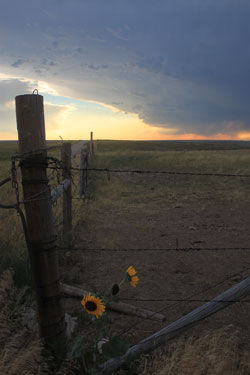With warmer weather just around the corner, most of us are fixated on catching some rays, beautifying the lawn and spring cleaning. But, not to rain on your parade, this is also a critical time to prepare your loved ones and home for spring and summer storms.
It’s important to craft a game plan so you’re prepared in the event of severe weather and know what to do after a storm. Black Hills Energy is here to help—we work hard to deliver safe and reliable energy, but occasionally the weather or other circumstances can cause challenges. Summer storms—including hail, intense winds, flooding, tornadoes, fires and more—could bring anything from power outages to severe home damage. Below are some key tips to help keep you safe and well-prepared this season:
Create your own emergency toolkit
Your custom storm emergency toolkit—whether it be in a drawer, bag or other—must be easy to access, especially in the case of a power outage. Every one of your family members should know where it’s located. Load your toolkit with fresh batteries, a flashlight, battery-powered radio, first aid kit and portable cell phone chargers.
A plan for life support
If you have a family member who relies on life support, like supplemental oxygen or devices requiring electric power, secure a location where their specific needs can be met if you lose electric service. Also, call Black Hills Energy at 888-890-5554 to ensure we’re aware that a life-support system is present in your home.
During the storm to-do’s
In the case of a power outage, do not open your refrigerator or freezer more often than needed—as undisturbed food will remain frozen in most freezers for 12 to 48 hours. Avoid using oil lamps, candles or lanterns, as they can present a fire risk. Also, be sure to unplug sensitive computer and electronic equipment or protect them with a high-quality surge protector. Leave a lamp or radio on, so you’re aware when service is restored.
Run your generator safely
Need to use a generator for power after a storm? If so, be very cautious. Never run a generator indoors or in an enclosed space and place it at least 20 feet away from your home—with the engine exhaust pointed away from windows and doors. Generators should not be connected to home wiring without an approved device that ensures electricity isn’t fed back via electric supply lines—otherwise, you could potentially electrocute line workers and destroy your generator.
A point about power lines
If you see a downed power line, please assume it’s energized. Never touch or attempt to pick up a fallen line, and don’t try to rescue someone in contact with a power line. Be careful when clearing debris to make sure it hasn’t come in contact with a power line. Rather, call 911 and 888-890-5554 right away.
Check for damaged gas meters and service masts
Gas meters can easily be damaged from hail, falling trees, settling or erosion—potentially causing a leak hazard. If you think your meter may be damaged, give us a call at 888-890-5554 and we’ll come by to take a closer look. Homeowners are also responsible for damage to their service mast, which is on the outside of your home on the roof or at your meter and looks like a metal tube or pipe. It feeds electricity to your home from the overhead power lines. If it’s damaged, contact a certified electrician to schedule a repair.
For more tips on how to navigate spring and summer storms, visit www.blackhillsenergy.com/weather.
James P. Williams, Wichita, Kansas, is a senior community affairs program manager for Black Hills Energy.



